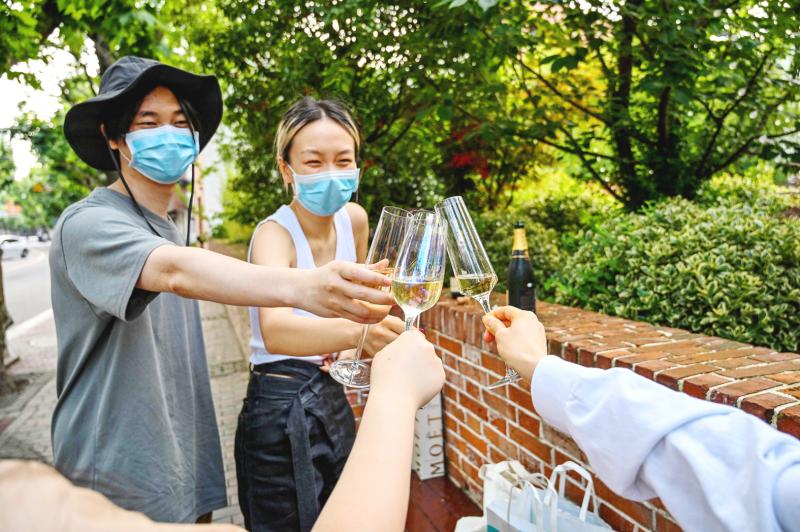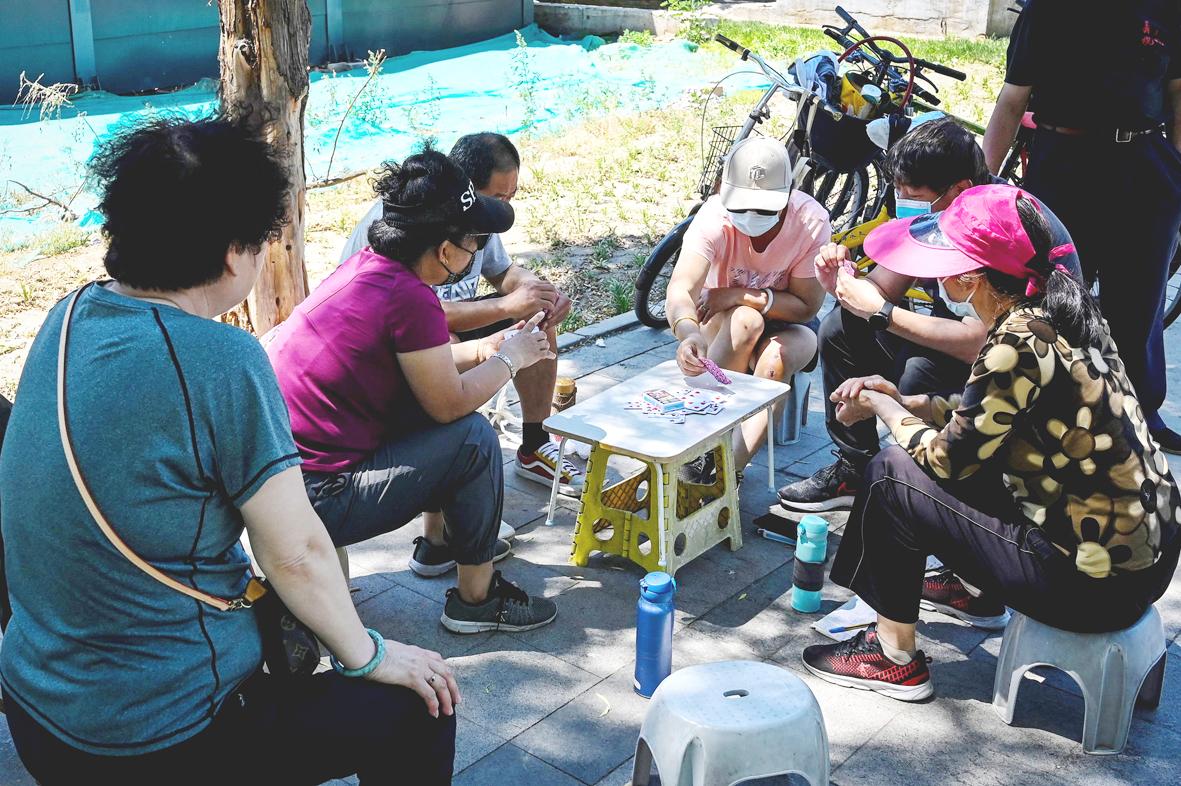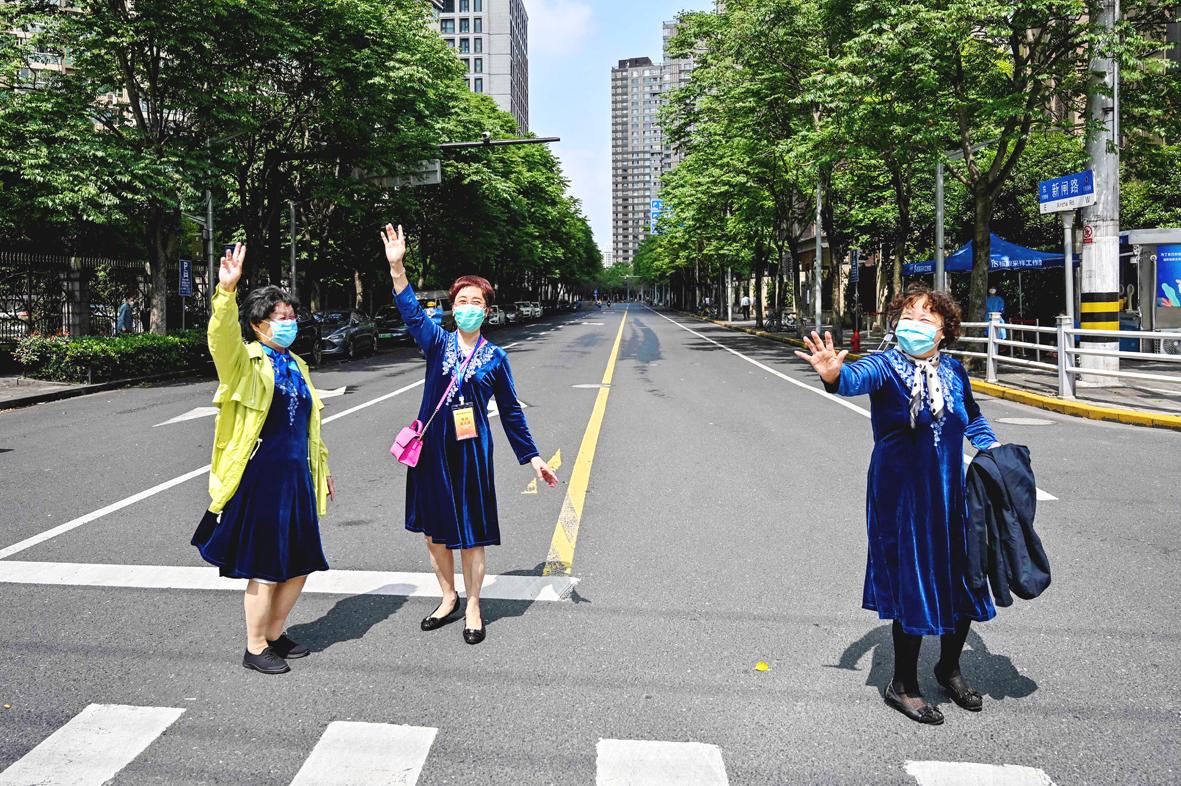Mothers hosting playdates near cordoned-off parks, mahjong maestros huddled in streets and youngsters slugging night-time beers on barricaded sidewalks — Beijingers are making the most of the small spaces available as China’s COVID-19 controls close in.
Meanwhile in Shanghai, a growing number of residents are being allowed to briefly venture outside as the city gradually eases out of an extended lockdown, celebrating their first hours outside in weeks with champagne and roadside picnics.
China is hitched to a zero-COVID policy that triggers mass lockdowns, routine tests and movement restrictions whenever infection clusters emerge — the last major economy to do so in a world now living with the coronavirus.

Photo: AFP
Beijing, a city of 22 million people, looked on in horror as Shanghai entered a slow-motion lockdown last month, with millions still under stay-at-home orders.
The capital has recorded just dozens of cases each day but has also gone quiet since the beginning of the month with schools closed and everyone — other than doctors and a few essential workers — told to work from home. Now the city is watching and waiting to see which way the virus trends.
Hundreds of thousands of people have been restricted to their homes, still well short of a full lockdown but enough to leave only the brave and the rebellious out on the streets of a pandemic-weary city.

Photo: AFP
“Everything is closed! Cinemas, museums ... football pitches,” said Eric Ma, a programmer sharing a few beers with friends around the Liangma River in downtown Beijing.
“It feels claustrophobic. We have to find creative ways to have fun.”
CAT-AND-MOUSE

Photo: AFP
Those, like Ma, who venture out face a cat-and-mouse game with police and city authorities enforcing strict virus rules and sealing off access to riverbanks and other gathering spots.
A large blue sign near the river captured the authorities’ approach: “Be patient to enjoy the sunshine when the pandemic ends.”
Still, dozens of people were seen jumping over the barricades or wriggling through police tape to go for a dip on a warm Monday afternoon.
A middle-aged man stood in the water singing an aria from a famous Peking Opera. Some brought folding chairs, tables and small gas stoves to cook outside.
Since restaurants have been shuttered, only allowing takeout, and many housing blocks not permitting visitors, people have started picnicking on pavements.
“The guards come from time to time and chase us away,” said Reiner Zhang, a fashion designer who had spread her picnic mat on a street corner near the Liangma River.
“But we don’t care. People are frustrated with pay cuts and layoffs and we need to meet and vent,” she said.
Parents sat on the riverbank, eating watermelon, while children paddled along the shallow edges of the river.
“We bring the children here for some exercise,” said Niu Honglin, pointing to her seven-year-old son bobbing up and down in the river with his floaters.
“With parks closed, there are no places to play, but children start throwing tantrums if they are stuck at home all day doing online lessons.”
BRIEF RELIEF IN SHANGHAI
Old neighborhoods in the heart of Beijing, normally bustling warrens filled with hawkers, tourists and rickshaw drivers, have also been closed. But a couple posed for wedding photos in front of the old drum tower on Monday, while on a nearby street retirees gathered to play mahjong, flouting strict social distancing rules.
“We come here after lunch every day, and play until the sun goes down,” said a retired municipal worker who only offered his last name Zao. “We’ve done it for years and the pandemic won’t stop us.”
In Shanghai, residents are slowly emerging from the other side of a lockdown during which millions were banned from stepping out of their homes.
The mood was festive in the central Jing’an district on Wednesday outside one apartment compound where residents were finally permitted to step outside — for only two hours —- after 55 days indoors.
A masked quartet of friends toasted their brief freedom with champagne, while a group of older women put on their Sunday best for a long-awaited stroll through the neighborhood.
A barber in protective gear gave customers haircuts in a makeshift roadside salon, as most hairdressers in the city remained shut.

A vaccine to fight dementia? It turns out there may already be one — shots that prevent painful shingles also appear to protect aging brains. A new study found shingles vaccination cut older adults’ risk of developing dementia over the next seven years by 20 percent. The research, published Wednesday in the journal Nature, is part of growing understanding about how many factors influence brain health as we age — and what we can do about it. “It’s a very robust finding,” said lead researcher Pascal Geldsetzer of Stanford University. And “women seem to benefit more,” important as they’re at higher risk of

Eric Finkelstein is a world record junkie. The American’s Guinness World Records include the largest flag mosaic made from table tennis balls, the longest table tennis serve and eating at the most Michelin-starred restaurants in 24 hours in New York. Many would probably share the opinion of Finkelstein’s sister when talking about his records: “You’re a lunatic.” But that’s not stopping him from his next big feat, and this time he is teaming up with his wife, Taiwanese native Jackie Cheng (鄭佳祺): visit and purchase a

April 7 to April 13 After spending over two years with the Republic of China (ROC) Army, A-Mei (阿美) boarded a ship in April 1947 bound for Taiwan. But instead of walking on board with his comrades, his roughly 5-tonne body was lifted using a cargo net. He wasn’t the only elephant; A-Lan (阿蘭) and A-Pei (阿沛) were also on board. The trio had been through hell since they’d been captured by the Japanese Army in Myanmar to transport supplies during World War II. The pachyderms were seized by the ROC New 1st Army’s 30th Division in January 1945, serving

Mother Nature gives and Mother Nature takes away. When it comes to scenic beauty, Hualien was dealt a winning hand. But one year ago today, a 7.2-magnitude earthquake wrecked the county’s number-one tourist attraction, Taroko Gorge in Taroko National Park. Then, in the second half of last year, two typhoons inflicted further damage and disruption. Not surprisingly, for Hualien’s tourist-focused businesses, the twelve months since the earthquake have been more than dismal. Among those who experienced a precipitous drop in customer count are Sofia Chiu (邱心怡) and Monica Lin (林宸伶), co-founders of Karenko Kitchen, which they describe as a space where they